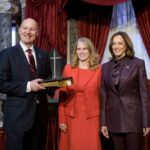

French far-right leader Marine Le Pen’s party managed to shore up enough seats to form an official parliamentary group for the first time since 1986 in Sunday’s runoff parliamentary elections.
With 577 seats up for grabs in France’s National Assembly, the lower house of Parliament, Le Pen’s National Rally won 89 seats, up 81 seats from 2017, when the party held eight seats, according to initial projections. Meanwhile, President Emmanuel Macron’s centrist alliance, Ensemble, is projected to lose his absolute majority, giving a huge blow to his reform agenda, according to France 24.
LE PEN RETURNS TO CAMPAIGN FOR FRENCH PARLIAMENT AFTER LOSS TO MACRON
Projections based on partial results show that Macron will have to settle for 224 seats, falling short of an absolute majority at 289 seats, according to France 24. The results are a huge defeat for the president, who won 351 seats back in 2017.
A challenge from a left-wing political coalition led by Jean-Luc Melenchon, also fell short of a majority but is projected to win 149 seats. With no group reaching an absolute majority, it opens up a period of political uncertainty in France that will require parties to share power to pass policies, something that has not been seen in recent decades.
Le Pen’s National Rally, though, is expected to make one of the biggest splashes of the night.
“In terms of number of votes, it’s a record, it marks the return of a far-right parliamentary group which hasn’t existed since 1986,” political scientist Dorian Dreuil told RFI prior to the election. “When you have a parliamentary group, you get extra money, you’re given more time to speak, more visibility as well. It’s a way of imposing yourselves for the next five years.”
In order to form a parliamentary group, a political group must win 15 seats, allowing them certain privileges, such as more allocated speaking time, money to cover their expenses and staff, etc. Parliamentary groups also have the power to request that a session be suspended.
The National Rally has not formed an official parliamentary group since the 1986 election, when the party was known as the National Front under the leadership of Le Pen’s father, Jean-Marie Le Pen. During that time, the French government experimented with proportional representation, though it was abolished in the subsequent legislative election.
“So, on a historical level, it’s clear that Marine Le Pen has succeeded in doing what the National Front never managed until now,” Erwan Lecoeur, a political sociologist, told France 24. “She has managed something her father and the party never did before.”
Le Pen, who is hot off the heels of her own presidential run, had hoped to help snag the majority from Macron.
France operates under a two-round voting system, one week apart, for legislative elections. In each of the 577 electoral districts, French citizens cast their vote for a candidate. Unless a candidate wins an absolute majority in the first round, or 50% of the vote, then each candidate running that received at least 12.5% of the vote in the first round moves on to the second round. In the second round, the candidate who gains the most votes wins the seat.
CLICK HERE TO READ MORE FROM THE WASHINGTON EXAMINER
The freshly elected lawmakers will form the 16th Legislature of the Fifth French Republic and are set to begin their five-year terms on June 22.







